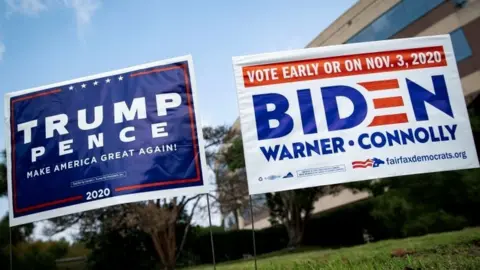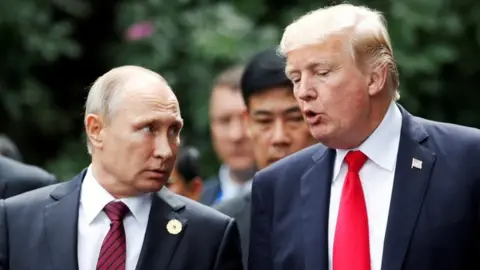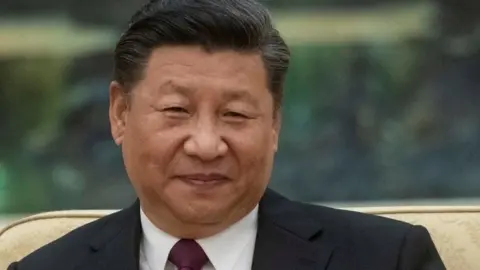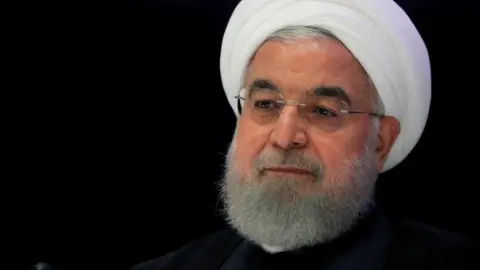US election 2020: Who do Russia, China and Iran want to win?
 Reuters
ReutersWill the Kremlin be trying to "Keep America Great"? Is Beijing rooting for Biden?
These questions are on the minds of the US intelligence community in the run-up to November's vote. An assessment from a top official warns foreign powers will use "covert and overt influence measures" to try to sway US voters, singling out Russia, China and Iran.
The three should not be compounded, as each, in the view of US intelligence, has their own goal and their own capabilities.
The assessments themselves are under scrutiny too - a whistleblower recently alleged he was asked to downplay the threat posed by Russia as it "made the president look bad".
So with a little over a month to go, what do US voters need to know?
RUSSIA
What does the intelligence say? As you may have noticed, Russia had a scene-stealing role in the 2016 US election and its aftermath.
In short, US intelligence believe Russia tried to sway the vote in favour of Donald Trump, pointing to meetings between his team and Russian officials, a cyber attack against Hillary Clinton's presidential campaign and the Democrats, the targeting of state voter databases, and efforts to amplify false or partisan material online.
Last month a Republican-led Senate panel gave further support to the view Russia wanted Trump to win, concluding his campaign was an easy target for foreign influence but stopping short of alleging criminal conspiracy.
 Reuters
ReutersAs for 2020, this time swap Hillary Clinton for Joe Biden. In his assessment, intended to be read by the American public, the head of the National Counterintelligence and Security Center (NCSC) William Evanina said Russia was "using a range of measures to primarily denigrate former Vice-President Biden".
In the view of FBI director Christopher Wray, Russia has never stopped meddling, calling efforts in the 2018 congressional elections a "dress rehearsal for the big show in 2020".
Russia has consistently denied interfering in foreign elections. Earlier this year a Kremlin spokesman called accusations of meddling "paranoid announcements" that had "nothing to do with the truth".
Whether Russia wants a second term for President Trump or not, another view often expressed by analysts is that the country has a broader aim of destabilising rivals by spreading confusion.
For example this year an EU document alleged there was a Russian campaign to push fake news about coronavirus to make it harder for the bloc to communicate its response. Russia called the claims unfounded.
What do the candidates say? Joe Biden recently warned there would be a "price to pay" if Russia continues to interfere, calling Russia an "opponent" of the US.
President Trump has frequently downplayed allegations of Russian interference, putting him at odds with his own intelligence experts.
After a 2018 summit with Vladimir Putin, asked whether he believed the US intelligence community or the Russian president about the claims Mr Trump said: "President Putin says it's not Russia. I don't see any reason why it would be." He later said he had misspoken.
CHINA
What does the intelligence say? Prominent voices in the Trump administration have argued that it is China, rather than Russia, that poses the main threat this year.
"I've seen intelligence. That's what I've concluded," the Attorney General William Barr said. Democrat Adam Schiff, who chairs the House of Representatives Intelligence Committee, accused Mr Barr of "flat-out lying" with the comments.
In his assessment, Mr Evanina said US intelligence believes "China prefers that President Trump - whom Beijing sees as unpredictable - does not win re-election".
 Reuters
Reuters"China is expanding its influence efforts to shape the policy environment in the United States, pressure political figures it views as opposed to China's interests, and counter criticism of China," he said.
The use of the word "influence" is notable. Although China has sophisticated ways to influence opinions - cyber monitors the Stanford Internet Observatory list "content farms, 'astroturf' commenter brigades, and fabricated accounts and personas on social media channels" how far China is actually prepared to go is unclear. "China will continue to weigh the risks and benefits of aggressive action," said Mr Evanina.
The intention may be more to do with promoting China's worldview. Facebook recently shut down a network of China-linked accounts much of which supported the Chinese state, such as its interests in the disputed South China Sea.
China has denied interfering in other countries' domestic affairs, saying it is not "interested or willing to do so".
What do the candidates say? This month, President Trump approvingly retweeted an article on the Trump leaning Breitbart website entitled "China seems 'to be favouring Joe Biden' in presidential election".
"Of course they want Biden. I have taken $Billions from China and given it to our Farmers and U.S. Treasury. China would own the U.S. if Biden & Hunter got in!" Mr Trump wrote, referring to Joe Biden's son Hunter.
US-China ties are at a low ebb, with disputes over everything from the coronavirus to China's imposition of a controversial security law in Hong Kong.
Joe Biden has sought to fend off accusations from President Trump he is soft on China, promising to be "firm" on human rights and other issues. Democrats though argue that when it comes to the election at least, it is Russia that is being most aggressive.

Who does US fear most? Depends who you ask

In 2016, the US government, as well as social media companies, were slow to confront Russian interference. This time no one is staying quiet but the landscape has changed.
Companies are talking loudly about what they are doing and the US intelligence community is publishing regular assessments.
But the issue has become deeply politicised.
Democrats are focused on Russian interference helping President Trump whilst his supporters have tried to switch attention to Chinese influence working against his re-election.
National security officials have tried to walk a fine line - acknowledging both are happening (as well as lower-level Iranian influence) but trying to avoid acknowledging there are differences because of concerns of being drawn into the partisan fight.
Russian interference has looked both more organised and covert so far, but not necessarily yet on the same scale or with the same impact as the hack and leak of emails from Democrats in 2016.
Tactics have also evolved with those seeking to interference often amplifying genuine, US news and posts rather than making up fake material.
And there are worries that more may be coming in the closing stages of the campaign including potentially efforts to undermine the credibility of the electoral process itself.

IRAN
What does the intelligence say? In his statement Mr Evanina says that Tehran is against another term for President Trump, which it believes will result "in a continuation of US pressure on Iran in an effort to foment regime change".
Iran's efforts, he says, will focus on "on-line influence, such as spreading disinformation on social media and recirculating anti-US content".
Backing up the allegations made by US intelligence, computing giant Microsoft said hackers with ties to to Russia, China and Iran, are attempting to spy on key figures involved in the US election.
On Iran, it said an Iranian group known as Phosphorus had unsuccessfully sought to access accounts of White House officials and Mr Trump's campaign staff between May and June of this year.
 Reuters
ReutersAn Iranian foreign ministry spokesman called Microsoft's report "farcical". "Iran is not concerned about who will take presidency in the White House," said Saeed Khatibzadeh.
A report on Iranian influence efforts earlier this year from the Atlantic Council characterised Iran as being focussed on promoting a national agenda, such as its bid for regional supremacy.
"Nearly all content spread by Iran's digital influence efforts relates directly to its worldview or specific foreign policy objectives. Consequently, it is easier to identify the operations of Iran than those of other actors like Russia, whose content is more likely to be politically agnostic," it said.
What do the candidates say? Iran has not figured as prominently in the US election as Russia or China, both in terms of its possible influence or in policy.
President Trump has pursued an aggressive policy against Iran, withdrawing from the nuclear deal and ordering the killing of the powerful general Qasem Soleimani.
Joe Biden says this policy has failed. In an editorial for CNN, he said there was "a smart way to be tough on Iran", pledging to push back the country's "destabilising activities" while also offering it a "path to diplomacy".



The US election is complicated. We want to know what questions you have about it, from candidate policies to the voting process to what might happen after 3 November.
Here are some of the stories we've already done based on reader questions:
Send us your questions using the form below. If you can't see the forms, you may need to view the site on a desktop.
In some cases, your question will be published, displaying your name, age and location as you provide it, unless you state otherwise. Your contact details will never be published. Please ensure you have read our terms & conditions and privacy policy.
